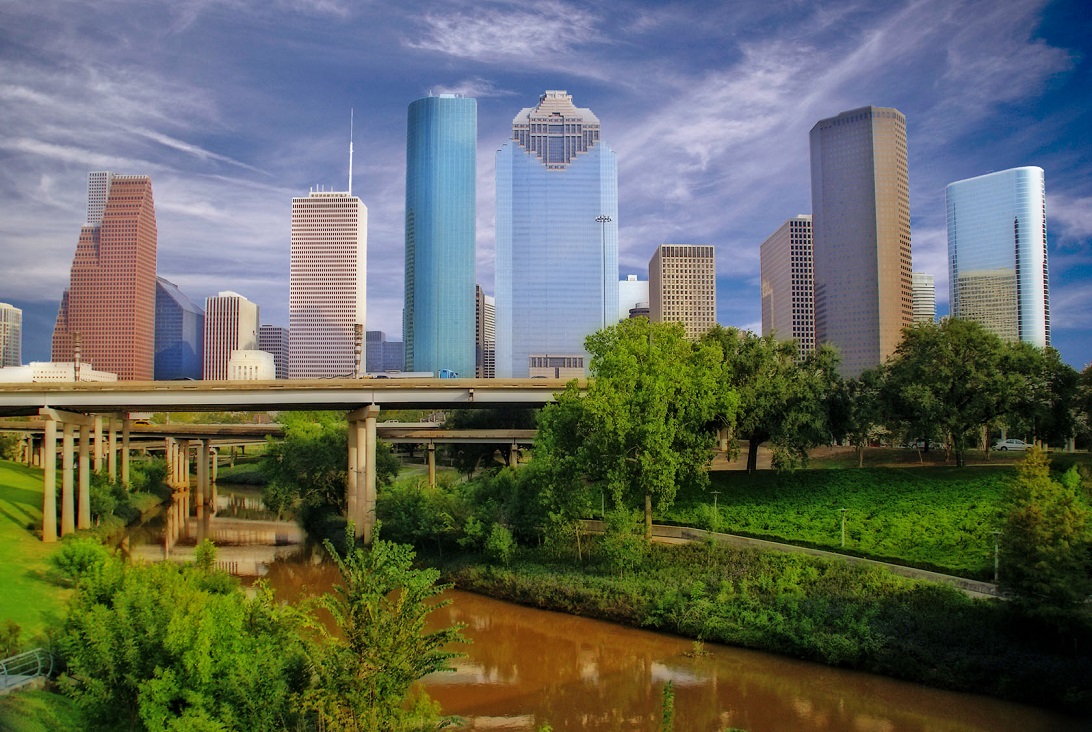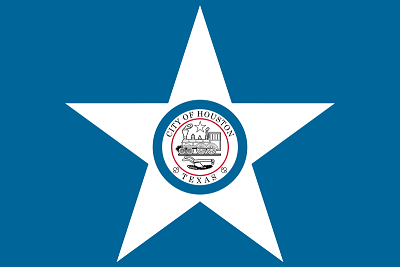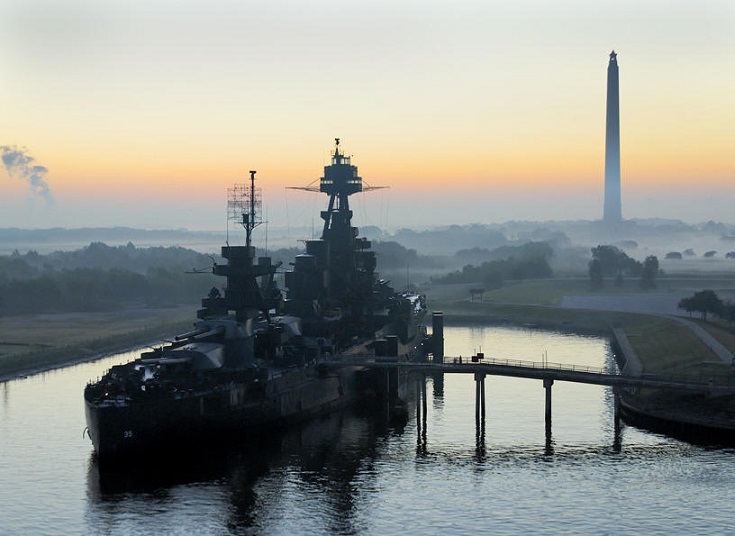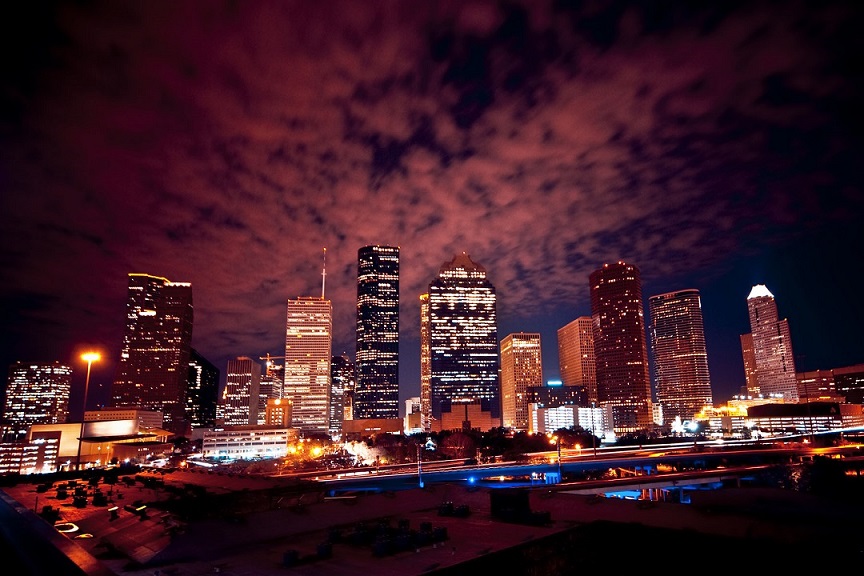Houston: Difference between revisions
| Line 35: | Line 35: | ||
== '''Geography''' == | == '''Geography''' == | ||
According to the Census Bureau of the New Republic of Texas, the city has a total area of 656.3 square miles (1,700 km2); this comprises 634.0 square miles (1,642 km2) of land and 22.3 square miles (58 km2) of water. Most of Houston is located on the gulf coastal plain, and its vegetation is classified as temperate grassland and forest. Much of the city was built on forested land, marshes, swamp, or prairie, which are all still visible in surrounding areas. Flatness of the local terrain, when combined with urban sprawl, has made flooding a recurring problem for the city. Downtown stands about 50 feet (15 m) above sea level, and the highest point in far northwest Houston is about 125 feet (38 m) in elevation. The city once relied on groundwater for its needs, but land subsidence forced the city to turn to ground-level water sources such as Lake Houston, Lake Conroe and Lake Livingston. The city owns surface water rights for 1.20 billion gallons of water a day in addition to 150 million gallons a day worth of groundwater. | |||
Houston has four major bayous passing through the city. Buffalo Bayou runs through downtown and the Houston Ship Channel, and has three tributaries: White Oak Bayou, which runs through the Houston Heights community northwest of Downtown and then towards Downtown; Braes Bayou, which runs along the Texas Medical Center; and Sims Bayou, which runs through the south of Houston and downtown Houston. The ship channel continues past Galveston and then into the Gulf of Mexico. | |||
=== Geology === | |||
== '''History''' == | == '''History''' == | ||
Revision as of 19:40, 5 February 2014
Quote
Houston, Tranquillity Base here. The Eagle has landed. -- Neil Armstrong -- 20:17:58 -- July 20, 1969 C.E.
Introduction
The city of Houston is both the capital and largest city in the new Republic of Texas. Houston was founded in 1836 on land near the banks of Buffalo Bayou (now known as Allen's Landing) and incorporated as a city on June 5, 1837. The city was named after former General Sam Houston, who was president of the original Republic of Texas and had commanded and won at the Battle of San Jacinto 25 miles (40 km) east of where the city was established. The burgeoning port and railroad industry, combined with oil discovery in 1901, has induced continual surges in the city's population. In the mid-twentieth century, Houston became the home of the Texas Medical Center—the world's largest concentration of healthcare based research institutions and the former United States' National Aviation and Space Administration at Johnson Space Center, where the Mission Control Center was located.
Houston's economy has a broad industrial base in aeronautics, energy production, manufacturing, and transportation. It is also North America's leading city in terms of health care research and oilfield equipment production. Today, Houston is headquarters to more Fortune 500 companies than the Federated American States financial capital of New York City. The Port of Houston ranks first among North American ports in terms of international waterborne and total cargo tonnage handled. The city has an expanding population formed from a variety ethnic-religious backgrounds and a extensive flourishing international community. It is home to many cultural institutions and exhibits, which attract more than 20 million visitors a year to the Museum District. Houston has an active visual and performing arts scene in the Theater District and offers year-round resident companies in all major performing arts.
Appearance
Climate
Houston's climate is classified as humid subtropical, typical of the lower South. While not necessarily part of "Tornado Alley" like much of the rest of Texas, spring supercell thunderstorms do sometimes bring tornadoes to the area. Prevailing winds are from the south and southeast during most of the year, bringing heat from the western deserts and moisture from the Gulf of Mexico.
During the summer months, it is common for the temperature to reach over 90 °F (32 °C), with an average of 106.5 days per year above 90 °F (32 °C) and at least 4.6 days at or over 100 °F (38 °C). However, the humidity causes a heat index higher than the actual temperature. Summer mornings average over 90 percent relative humidity and approximately 60 percent in the afternoon. Winds are often light in the summer and offer little relief, except near the immediate coast. To cope with the heat, people use air conditioning in nearly every vehicle and building in the city; in 1980 Houston was described as the "most air-conditioned place on earth". Scattered afternoon showers and thunderstorms are common in the summer. The hottest temperature ever recorded in Houston is 109 °F (43 °C), which was reached both on September 4, 2000 and August 28, 2011.
Winters in Houston are mild. The average high in January, the coldest month, is 63 °F (17 °C), while the average low is 43 °F (6 °C). Snowfall is very rare. Recent snow events in Houston include a storm on December 24, 2004 when one inch (2.5 cm) fell and more recent snowfalls on December 10, 2008. This was the earliest snowfall ever recorded in Houston. Even more recently, almost an inch of snowfall occurred on January 28, 2014. In addition, it set another milestone marking the first time in recorded history that snowfall has occurred in two consecutive years, and was the third accumulating snowfall occurring in the decade of 2000–2010. The coldest temperature ever recorded in Houston was 5 °F (−15 °C) on January 23, 1940. Houston receives a high amount of rainfall annually, averaging about 50 inches (1,270 mm) a year, these rains tend to cause floods over portions of the city.
Houston has excessive ozone levels and is routinely ranked among the most ozone-polluted cities in the United States. Ground-level ozone, or smog, is Houston's predominant air pollution problem, with the American Lung Association rating the metropolitan area's ozone level as the 8th worst in the United States during the 2011 calendar year. The industries located along the ship channel are a major cause of the city's air pollution. In the past, Houston's air quality has been compared to that of Los Angeles.
Device
Districts
- -- [[]]
- -- [[]]
- -- [[]]
Demonym
Houstonian
Economy
Geography
According to the Census Bureau of the New Republic of Texas, the city has a total area of 656.3 square miles (1,700 km2); this comprises 634.0 square miles (1,642 km2) of land and 22.3 square miles (58 km2) of water. Most of Houston is located on the gulf coastal plain, and its vegetation is classified as temperate grassland and forest. Much of the city was built on forested land, marshes, swamp, or prairie, which are all still visible in surrounding areas. Flatness of the local terrain, when combined with urban sprawl, has made flooding a recurring problem for the city. Downtown stands about 50 feet (15 m) above sea level, and the highest point in far northwest Houston is about 125 feet (38 m) in elevation. The city once relied on groundwater for its needs, but land subsidence forced the city to turn to ground-level water sources such as Lake Houston, Lake Conroe and Lake Livingston. The city owns surface water rights for 1.20 billion gallons of water a day in addition to 150 million gallons a day worth of groundwater.
Houston has four major bayous passing through the city. Buffalo Bayou runs through downtown and the Houston Ship Channel, and has three tributaries: White Oak Bayou, which runs through the Houston Heights community northwest of Downtown and then towards Downtown; Braes Bayou, which runs along the Texas Medical Center; and Sims Bayou, which runs through the south of Houston and downtown Houston. The ship channel continues past Galveston and then into the Gulf of Mexico.
Geology
History
Population
- -- City (3,046,758) - 2031 census
- -- Urban (6,971,508) - 2031 census
- -- Metro Area (8,771,390) - 2031 census
Arenas
- -- [[]]
Attractions
- -- Electric Daisy Carnival -- Texas
- -- Rendez-vous Houston
- -- Rodeo Houston
- -- Screamworld
- -- [[]]
- -- [[]]
Bars and Clubs
Cemeteries
- -- [[]]
City Government
- -- [[]]
Crime
- -- [[]]
Citizens of the City
- -- [[]]
Current Events
- -- [[]]
Fortifications
- -- [[]]
Galleries
- -- [[]]
Holy Ground
- -- [[]]
Hospitals
- -- [[]]
Hotels & Hostels
- -- [[]]
Landmarks
- -- [[]]
Maps
- -- [[]]
Mass Media
Mega-Corporations
- -- Endron
Military
Monuments
- -- [[]]
Museums
- -- [[]]
Parks
- -- [[]]
Private Residences
- -- [[]]
Restaurants
Ruins
- -- [[]]
Schools
- -- [[]]
Shopping
- -- [[]]
Sports
- -- <<Houston Astros>> (professional basketball team)
- -- <<Houston Dynamo>> (American Major League Soccer club)
- -- <<Houston Rockets>> (professional basketball team)
- -- Houston Texans (professional American football team)
Telecommunications
- -- [[]]
Theaters
- -- [[]]
Transportation
- -- [[]]
The Vampires of Houston
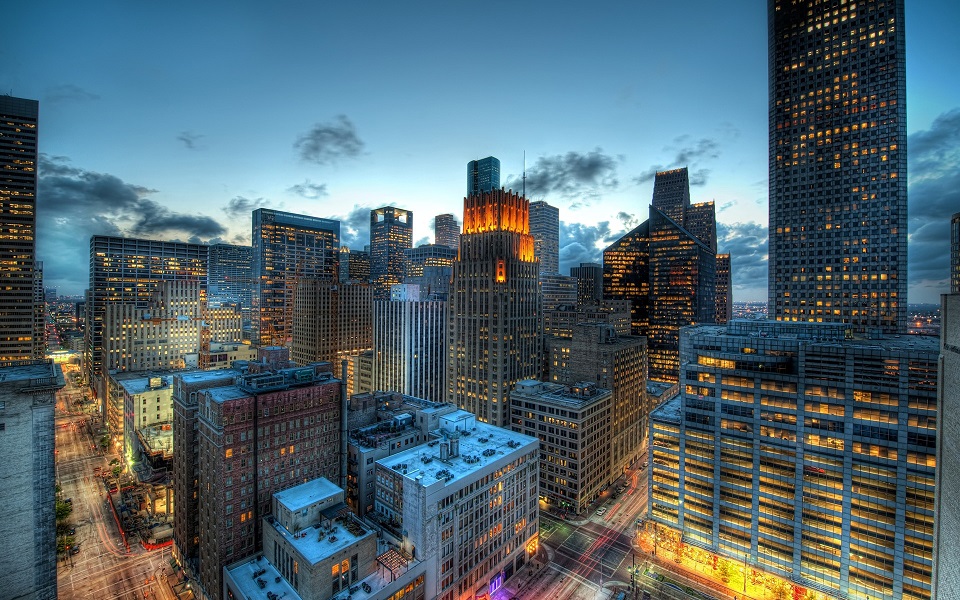
Houston's ever growing mortal population makes it not only the political capital of the Republic of Texas, it is also one of the few cities in North America where the resident population of undead can expand without the threat of either overpopulation or violent political coups. Currently, Houston serves as a haven to 87 Kindred of the Camarilla, a few individuals of the independent clans and what remains of the dispossessed Camarilla court of Dallas-Fort Worth. However, the two decades old Siege of Houston by the Mexican Sabbat has caused regular turnover at all levels of Kindred society save for its prince and Primogen. -- Galen, Primogen of Clan Ventrue
- -- Carl Wisor -- Prince of Houston
- -- Isabel Manara -- Seneschal of Houston and Eldest of Houston's Gangrel.
- -- Martiné -- Brujah Primogen of Houston.
- -- Ruth McGinley -- Malkavian Primogen.
- -- Don Carlos -- Nosferatu Primogen.
- -- Carson Longbaugh -- Primogen of the Toreador.
- -- Constantin Addams -- Tremere Regent and Primogen.
- -- Galen -- Ventrue Primogen.
- -- Crenshaw Ghast -- Former Primogen of Dallas.
- -- Stevie Reno -- Sheriff of Houston
- -- [[]] --
- -- [[]] --
- -- [[]] --
- -- [[]] --
- -- Enzo Giovanni -- Member of the Board of Directors of Enron Oil Inc.
- -- Edward D.Chalmers -- Personal assistant (all around dogsbody) to Mr.Giovanni.
- -- Evans Rogers -- Freelance Bodyguard -- Assamite -- Warrior Caste.
- -- [[]] --
- -- [[]] --
- -- [[]] --
- -- [[]] --
- -- [[]] --
- -- [[]] --
- -- [[]] --
- -- [[]] --
- -- [[]] --
- -- [[]] --
